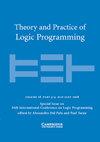《公平与偏见的逻辑理论
IF 1.1
2区 数学
Q3 COMPUTER SCIENCE, SOFTWARE ENGINEERING
引用次数: 0
摘要
近年来,机器学习中的公平性引起了人们的极大兴趣,因为在历史数据上训练的算法倾向于放大和延续历史偏见。在本文中,我们主张公平定义的正式重建,不是要取代现有的定义,而是将其应用于认知设置中,并允许丰富的环境建模。因此,我们研究了三个概念:通过无意识的公平、人口平等和反事实公平,并在认知情境演算中将它们形式化。本文章由计算机程序翻译,如有差异,请以英文原文为准。
Toward A Logical Theory Of Fairness and Bias
Abstract Fairness in machine learning is of considerable interest in recent years owing to the propensity of algorithms trained on historical data to amplify and perpetuate historical biases. In this paper, we argue for a formal reconstruction of fairness definitions, not so much to replace existing definitions but to ground their application in an epistemic setting and allow for rich environmental modeling. Consequently we look into three notions: fairness through unawareness, demographic parity and counterfactual fairness, and formalize these in the epistemic situation calculus.
求助全文
通过发布文献求助,成功后即可免费获取论文全文。
去求助
来源期刊

Theory and Practice of Logic Programming
工程技术-计算机:理论方法
CiteScore
4.50
自引率
21.40%
发文量
40
审稿时长
>12 weeks
期刊介绍:
Theory and Practice of Logic Programming emphasises both the theory and practice of logic programming. Logic programming applies to all areas of artificial intelligence and computer science and is fundamental to them. Among the topics covered are AI applications that use logic programming, logic programming methodologies, specification, analysis and verification of systems, inductive logic programming, multi-relational data mining, natural language processing, knowledge representation, non-monotonic reasoning, semantic web reasoning, databases, implementations and architectures and constraint logic programming.
 求助内容:
求助内容: 应助结果提醒方式:
应助结果提醒方式:


